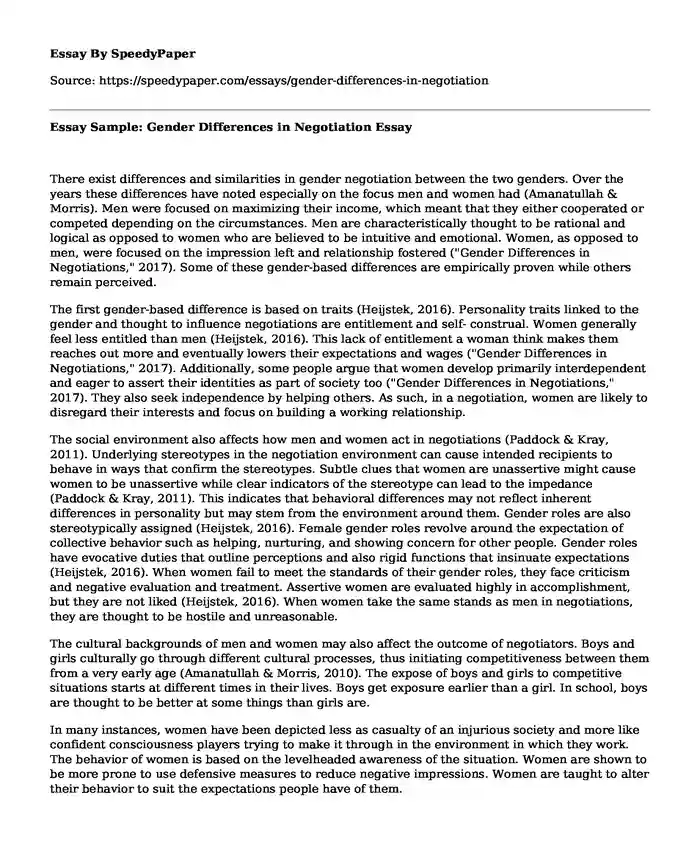
| Type of paper: | Course work |
| Categories: | Gender Communication |
| Pages: | 3 |
| Wordcount: | 674 words |
There exist differences and similarities in gender negotiation between the two genders. Over the years these differences have noted especially on the focus men and women had (Amanatullah & Morris). Men were focused on maximizing their income, which meant that they either cooperated or competed depending on the circumstances. Men are characteristically thought to be rational and logical as opposed to women who are believed to be intuitive and emotional. Women, as opposed to men, were focused on the impression left and relationship fostered ("Gender Differences in Negotiations," 2017). Some of these gender-based differences are empirically proven while others remain perceived.
The first gender-based difference is based on traits (Heijstek, 2016). Personality traits linked to the gender and thought to influence negotiations are entitlement and self- construal. Women generally feel less entitled than men (Heijstek, 2016). This lack of entitlement a woman think makes them reaches out more and eventually lowers their expectations and wages ("Gender Differences in Negotiations," 2017). Additionally, some people argue that women develop primarily interdependent and eager to assert their identities as part of society too ("Gender Differences in Negotiations," 2017). They also seek independence by helping others. As such, in a negotiation, women are likely to disregard their interests and focus on building a working relationship.
The social environment also affects how men and women act in negotiations (Paddock & Kray, 2011). Underlying stereotypes in the negotiation environment can cause intended recipients to behave in ways that confirm the stereotypes. Subtle clues that women are unassertive might cause women to be unassertive while clear indicators of the stereotype can lead to the impedance (Paddock & Kray, 2011). This indicates that behavioral differences may not reflect inherent differences in personality but may stem from the environment around them. Gender roles are also stereotypically assigned (Heijstek, 2016). Female gender roles revolve around the expectation of collective behavior such as helping, nurturing, and showing concern for other people. Gender roles have evocative duties that outline perceptions and also rigid functions that insinuate expectations (Heijstek, 2016). When women fail to meet the standards of their gender roles, they face criticism and negative evaluation and treatment. Assertive women are evaluated highly in accomplishment, but they are not liked (Heijstek, 2016). When women take the same stands as men in negotiations, they are thought to be hostile and unreasonable.
The cultural backgrounds of men and women may also affect the outcome of negotiators. Boys and girls culturally go through different cultural processes, thus initiating competitiveness between them from a very early age (Amanatullah & Morris, 2010). The expose of boys and girls to competitive situations starts at different times in their lives. Boys get exposure earlier than a girl. In school, boys are thought to be better at some things than girls are.
In many instances, women have been depicted less as casualty of an injurious society and more like confident consciousness players trying to make it through in the environment in which they work. The behavior of women is based on the levelheaded awareness of the situation. Women are shown to be more prone to use defensive measures to reduce negative impressions. Women are taught to alter their behavior to suit the expectations people have of them.
In conclusion, there is a difference in how men and women negotiate. Most of these differences are resultant of how the surrounding perceives these two genders. All factors considered, both sexes can perform impeccably under the same conditions, but the inhibitions in gender differences still stand. It is important to change the thoughts of people to consider all genders as equals.
References
Amanatullah, E. T., & Morris, M. W. (2010). Negotiating gender roles: Gender differences in assertive negotiating are mediated by women's fear of backlash and attenuated when negotiating on behalf of others. Journal of Personality and Social Psychology, 98(2), 256-267. doi:10.1037/a0017094
Heijstek, A. (2016). An exploration of gender differences in negotiation behavior. Business Communication and Digital Media.
Paddock, E. L., & Kray, L. J. (2011). The Role of Gender in Negotiation. Negotiation Excellence, 229-245. doi:10.1142/9789814343176_0013
Gender Differences in Negotiations. (2017, July 20). Retrieved from https://www.negotiations.com/articles/gender-interaction/
Cite this page
Essay Sample: Gender Differences in Negotiation. (2022, Jul 27). Retrieved from https://speedypaper.com/essays/gender-differences-in-negotiation
Request Removal
If you are the original author of this essay and no longer wish to have it published on the SpeedyPaper website, please click below to request its removal:
- Free Essay Example on the Prudhoe Bay Oil Spill
- Personal Essay Example on The Waves Knock Over
- College Students and Facebook, Free Essay for Everyone
- Free Essay Sample about Modern Technologies
- Good Officer - Interview Essay Example
- Essay Sample: Pain Management among African American Adults with Prostate Cancer
- Shaping America's History and Politics - Essay Sample
Popular categories




